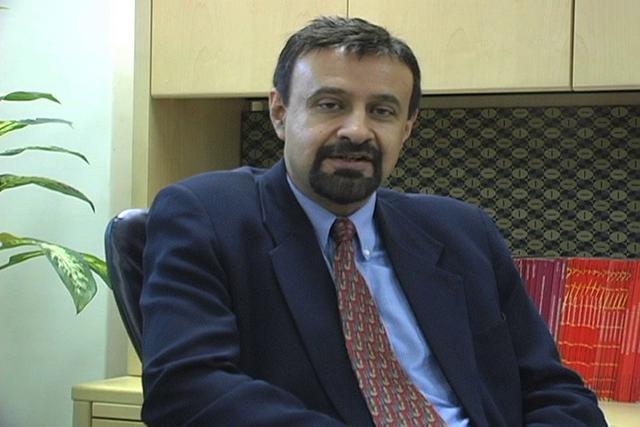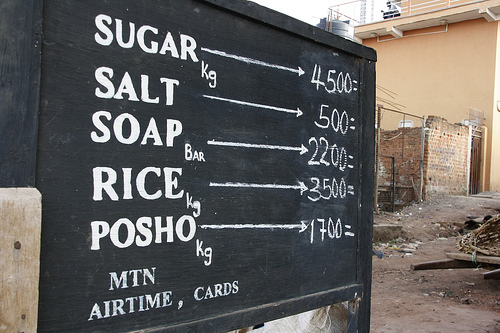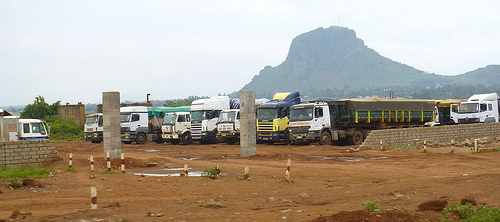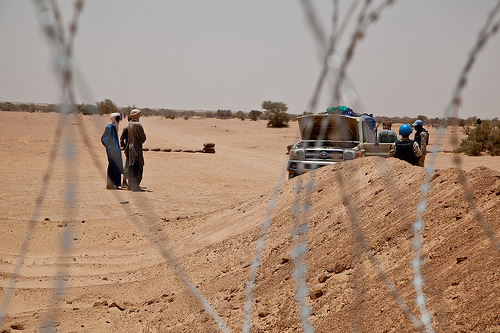MIR Interview: Kapil Kapoor

Kapil Kapoor is the Director of Strategy at the African Development Bank (AfDB). Prior to joining the AfDB, he was the World Bank representative for Uganda and Zambia. He agreed to sit down with the McGill International Review for an interview on February 15, 2014.
***
How did you enter international development and why?
I entered the field of international development largely by accident. I was always very interested in economics and for a period of time after studying economics, I decided to do my MBA in finance. After a while, I realized it was not for me. I decided to ultimately do a PhD in Economics and it became clear to me that I had two real options with an economics PhD: to become a professor or to do development work. I did my PhD in Washington at George Washington University and I met interesting people who were doing exotic things with their careers. So, it was my interest in economics, not being keen on an MBA in finance and seeing what my colleagues were doing that caused me to enter international development.
What was the best/worst experience of your career in international development? Do you have interesting stories/experiences from your early career?
My best experience has been seeing what you are trying to achieve play out at a local level. It is very interesting and fulfilling for me. Often you don’t see the impact of what you are doing at the time and ultimately finding out the impact you made is interesting. The tangible result it has on the lives of people is very interesting and exciting.
As for my worst experience, dealing with adverse living conditions and having to rough it out is especially difficult. I often had to spend long periods of time in areas infested with mosquitoes and scorpions. But these difficulties are worth it when you see the development impact that you are going to have. I have worked in at least a dozen countries in Africa and have conducted development work in Asia as well. Each country has a unique array of positive attributes and challenges, so it is impossible for me to pick one country, which stood out over all others.

My experience in Uganda was especially difficult and interesting, though. I lived in Uganda from 1989-1991 and again in 2011-12. When I first started working in Uganda, it had gone through turmoil and was emerging from the turmoil with a president who believed in development. To create effective structures, one needs to make a government function, which was difficult. Visiting Uganda, I was struck by the spectacular scenic beauty and the mists that come down from the sky. The tragedies, that Uganda had gone through was so incongruous with its scenic beauty. It is so hard to reconcile the scenic beauty with the troublesome politics. HIV-AIDS was, and is, a huge problem in Kampala. Children in Kampala were brought up by their grandparents as the middle cohort was wiped out by HIV AIDS and dealing with that was an immensely difficult challenge. Reconciling the beauty of the land with the challenges the people face is one of the most difficult aspects of development work in Africa.
What is the difference between working at the World Bank (your previous job) and the African Development Bank?
The World Bank is a global organization with people all over the world who are committed to development. It is based in Washington and you are worrying about development all over the world in a very developed place- there is a perception of distance. African perception of the World Bank is that is not trustworthy and it does not understand Africa’s needs as much as it could. Many policies were not accepted and were viewed as anti-people. Particular animosity towards the World Bank was reserved for the sacrifices people had to make in exchange for electricity and water. When the World Bank prescribed certain policies, many African leaders claimed that it did not have the welfare of the people at heart. African leaders viewed World Bank recommendations as scapegoats for economic problems and this resulted in non-compliance with their policy proposals.
The African Development Bank focuses on Africa and lives in Africa, so the closeness to clients and the physical proximity creates a much stronger relationship. Africans view the African Development Bank as their bank, so there is a sense of ownership, belonging and trust that renders the African Development Bank closer to the needs of the African people.
How do you balance the necessity for economic growth and a fair distribution of resources? Has the African Development Bank devised any policy proposals to promote sustainable development to restrict massive environmental degradation?
Growth is not good in and of itself. Growth is good, however, when it is inclusive and is shared with the quality of the growth that will generate jobs. For example, when comparing growth in Zambia with growth in Uganda- both have 5-6 %; but there has been a 50% decline in poverty in Uganda in recent years, while poverty levels are unchanged in Zambia. This is because Zambia has mining led growth and Uganda’s growth is faced on agriculture from small landholdings, which creates jobs. The quality of growth and the patterns of growth are crucial determinants of job creation and sustainable economic development.
Green growth and sustainable development are a key priority for the African Development Bank. Clients need to understand that growth can be both rapid and sustainable. Ethiopia has rapid green growth at 8% a year. This is because Ethiopia developed a strategy of comparative advantage with an 8% growth target that was done sustainably. Countries like Morocco demonstrate how to get large access to population with solar power. Wind farm projects in Lake Turkana in Kenya and Cape Verde are innovative tools to demonstrate that it does not have to be either environmental protection or economic growth. You can come up with innovative solutions that are sustainable and can lead to job creation. Ethiopia’s green growth was premised on the creative use of livestock and leather, which led to a booming footwear industry. Efficient utilization of resources and the need for the right tax environment are essential so revenues are invested in areas where people can benefit. Uganda has the large amounts of oil and oil revenues can be invested in education, skills development and training to train the youths.
Africa has, in the past years, experienced a wave of massive land purchases by foreign states seeking to secure agricultural land. Some have called this a new wave of colonialism. Is there any legitimacy to this view?
Land Purchases have garnered a great deal of media attention but when one considers the vast size of Africa, the data does not indicate that large-scale land purchases constitute a new wave of colonialism. The extent of the land purchases has also been overestimated. For example, Zambia has the foreign investors purchasing of land under cultivation, which generated employment and the employment improved people’s lives, which would not have happened if the land was not developed. The development of cash crop industries like sugar can create substantial employment as well. Therefore, land purchases are integral as they provide investment that bolsters economic development.
China has drastically increased investment in Sub-Saharan Africa in recent years. Do you feel this escalation in Chinese investment is largely positive or a counter-productive development that increases the dependency of African economies on natural resources? How can Africa more effectively leverage the influx of Chinese investments to promote economic diversification and improve working conditions?
Chinese investment is very positive and China has a mutually beneficial partnership with Africa. China has a lot of experience and knowledge in several areas such as establishing infrastructure, roads, and railway projects. Africa has lots of natural resources, which China needs so Africa’s exports are beneficial for China. African countries need the capital and investment from China and can derive benefits from it. Africa has had a long history of foreign investment and there is no substantial evidence that Chinese investment in Africa is any more harmful than the long history of European investment, despite the stigmatization of Chinese involvement in the West. People jump to general conclusions about Chinese investment, especially when it comes to human rights and working conditions. Its subjective, when the Europeans buying land or the US oil companies were investing in Africa, was that right? There needs to be an objective assessment, which hasn’t really been done- too many conclusions rely extensively on anecdotal evidence.

The Western media attention to the Zambian mining case highlights the tendency of people to rely on anecdotal evidence. Saying that the Chinese do not support good working conditions is too much of a leap of faith. We need a systematic evaluation and to articulate which standards of working conditions we are talking about. The African Development bank sets standards for working conditions and tries to make sure that those standards are being applied. The African Development Bank also encourages countries to develop labor regulations, give bargaining power to labor unions. There are many areas where working conditions in industries backed by Chinese investment would be considered acceptable.
Also, Chinese investments are sectorial in nature. The scope of Chinese investment, while significant is not large enough that you can really say a particular country has been transformed economically due to Chinese investment. In one country, road development is a priority and in another country, China may focus its resources on energy. Chinese investment has led to a movement towards manufacturing development in Africa and Chinese investments such as footwear in Ethiopia, heavy equipment, electrical equipment, and engineering have been particularly salient.
The African Development Bank always encourages countries to minimize barriers to trade, so it supports policies like the reduction of tariffs, physical border posts and improving the terms of trade between Africa and China. China is importing raw materials and exporting finished goods. African countries try add value to raw materials to keep more earnings in Africa, but specialization is necessary for value to really be maximized. Human capital development is required as skilled labor shortages in many industries limit the ability of Africans to add value. China has not substantially invested in education, which is a crowded market with so many external donors, and has focused on infrastructure, which it views as essential for African development. China makes investment decisions when there is a mutual benefit and infrastructure provides more benefits for both parties right now than education.
If working with corrupt or authoritarian governments is necessary to fund development projects, should international organizations do so? Why or why not?
The African Development Bank has had to contend with many governance problems and has addressed these issues at the sectoral and project level. Type of government is not the focus of the African Development Bank; the example of China shows that authoritarianism does not preclude successful economic development. Irrespective of the type of government, the African Development Bank is willing to work with countries to effectively use its funds and resources in development projects. If the government’s management of projects is poor the African Development Bank will not continue investing in that country, regardless of whether or not the regime is democratic. We have zero tolerance for corruption in projects and using resources for intended outcomes is the key barometer for success.
An example of an authoritarian regime, which cooperated with the African Development Bank, is Zimbabwe under Robert Mugabe in the early 2000s. In Zimbabwe, many projects did very well and the projects we undertook there were insulated from politicization. I cannot think of any country which has been extremely resistant to working with the African Development Bank, so the extent of benefits varies between countries and the nature of regimes can affect the level of benefits in some case. The African Development bank seeks to invest where every dollar we put in has the most development impact, though there are not enough formal studies to determine which countries are more effective than others.
How has the African Development Bank dealt with the instabilities resulting from the emergence of protracted failed state/conflict zones, such as Somalia, Sudan or Eritrea?
The African Development Bank has a fragile state strategy, which has recently been articulated in more depth at a summit headed by President Sirlieaf of Liberia. Liberia is a fragile state and other African countries can benefit from her experience of working, living and leading in a fragile state. The aim of the Sirleaf project is to create a series of recommendations, which can be internalized into a more coherent fragile state strategy. The African Development Bank does not subscribe to the notion of failed states, but prefers to analyze fragile situations. The term fragile state is more effective as it takes into account the many situations in which a previously stable state becomes fragile. My experience working in Somalia from 1987-88 before central authority breaks down makes this view more compelling. It is essential for the African Union to be more involved in dealing with fragile states, as the breakdown of authority in one state has ramifications for others. Once capacity can be built to deal with fragile situations, we can pre-empt and preventing severe refugee situations that those in Eritrea or Ivory Coast.
A major fragile state crisis that the African Development Bank has recently had to deal with is Mali. Mali is a classic example of a fragile state, as previously it was one of the most stable democracies in Sub-Saharan Africa. We engaged in active dialogue and discussion with the government authorities there and provided extensive technical advice.
These situations are beyond the scope of the capabilities and ideas one nation can bring to the table, so we look for help as well from the African Union. The African Union has become much more effective in recent years, especially in its responses to sudden military coups. It has clearly articulated and signaled to African states its standards for good governance and the ideal mechanisms of forging new institutions.

In cases of coups like Madagascar or Mali, the African Development Bank asks a set of questions before proceeding with a policy response. Is there a government in place? Is it representative? How should we react to the government? Is there a development impact? Depending on our answers to these questions, we determine whether we need to temporarily cut off development work in that country or if the environment is suitable to continue. In the case of Mali, we initially stopped our development efforts but we have recently restarted them.
In Egypt, our response was more favorable than Mali. After General Sisi’s takeover, the new Egyptian military regime informed the African Development Bank that they intended to continue with the past policies and our projects. The African Development Bank never cuts off relations with a particular country without consultation with the new leaders after a sudden regime change.
However, there are cases in which political instability makes development projects extremely difficult. The African Development Bank cut off relations with Eritrea and in Sudan, we have struggled with inefficiency and arrears when it comes to funding projects.
The youth bulge presents a myriad of economic and political challenges for African nations. How have has the African Development Bank attempted to address the unemployment crisis that has resulted from the youth bulge?
The African Development Bank has focused extensively on this problem and recently introduced the Financial Inclusion Agenda, which is devoted to providing investment in economic sectors that will help mitigate the youth unemployment crisis. The African workforce is a rapidly expanding market- 15 million new workers enter the labor force every year and the median age in many countries is around 20 years old. The youth dividend is both a huge advantage and an economic time bomb so it is central for development in Africa. The choice between mining and agriculture led growth (Zambia vs. Uganda) can determine employment prospects for youths.
Urbanization is not the key priority of the African Development Bank. What we focusing on is creating labor-absorbent growth, whether it be urban or rural is not that important. Developments in North Africa and the MENA region where youth unemployment catalyzed political unrest have been watched closely. There are no short-term solutions. We need to create the right technical and vocational training in order to ensure that youths accept the demands of the labor market. The creation jobs that is labor-absorbing, even if they are not necessarily capital-intensive is key.
What would you say to someone who wants to enter the field of international development?
Be patient. Be there for the long haul. International development does not lead to short-term solutions. If you are patient, it is very satisfying. Too many young people are so focused on job searching that they are missing out on many potential opportunities that come from the rapid demographic and economic expansion in developing regions like Africa. Young people should try to see how they can create jobs and create new industries, rather than just settle for whatever job is available to them. In Africa, there is boundless potential for this in so many sectors of the economy.
If you decide to enter international development, the key to a successful development project is understanding the client’s perspective. You need to see how they can accomplish what they are trying to do and how you can bring your best expertise to help them in that particular endeavor.
